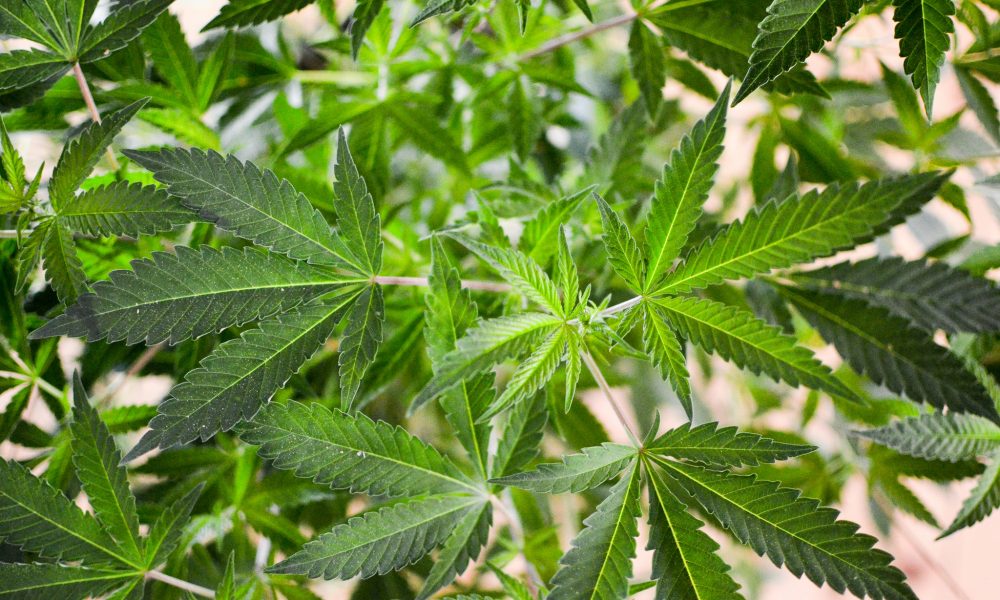A key Missouri Democratic lawmaker who chairs the state’s Legislative Black Caucus is calling on voters to reject a marijuana legalization initiative that will appear on the November ballot.
Rep. Ashley Bland Manlove (D) said in a statement on Tuesday that while she generally supports ending prohibition, the Legal Missouri 2022 measure lacks critical equity provisions, unnecessarily adds penalties and falls short of resolving the racial disparities of cannabis criminalization.
“The capitalism monster loves to exploit you, and that is what’s happening with this petition,” she argued. “Myself and like-minded community partners realized people from politicians to Bob on the street didn’t know the details. We want to make it known.”
Inbox: State Rep. @Manlove4M has started a coalition encouraging Missourians to vote against @LegalMo22 recreational marijuana amendment.
Concerns include civil penalties for weed use and lack of social equity in petition. #moleg pic.twitter.com/V9o9U6Kpna
— Kacen J. Bayless (@Kacen) August 30, 2022
The lawmaker said that she’s formed a group called the Impactful Canna Reform Coalition (ICRC), which is “comprised of local entrepreneurs, active community members, and concerned citizens who have read between the lines and want citizens to know how this constitutional amendment will impact them.”
The statement lists four main contentions with the campaign’s initiative, which was certified by the state earlier this month after officials determined that activists had turned in enough valid signatures for ballot placement.
Manlove said one of the main problems with the proposals is that it would be a constitutional amendment, making it extremely difficult to revise the law if voters approved the measure.
She also criticized what she described as “stop-and-cite” provisions that would fine people for public consumption and repeated offenses for possession and transportation of cannabis exceeding three ounces. That would “open the door for more citizen stops and could allow more room for law enforcement escalation,” the lawmaker argued.
When it comes to equity, Manlove said that the initiative doesn’t provide adequate reentry and workforce development services for those who have their marijuana records expunged or who are released from prison under the ballot initiative.
Finally, she said the Legal Missouri measure “introduces no new funding to create a direct pathway to ownership of a facility or additional educational or business training.”
The Black Caucus chair said that while she believes “Missourians should have the right to consume cannabis medically or at their leisure recreationally without undue or unnecessary government interference,” the current measure is “not right for Missouri.”
Like other reform advocates who have pushed back against the certified initiative, Manlove suggested that the issue could be more effectively handled legislatively, pointing to previously filed bills that “address marijuana reform with a more holistic approach.”
“It is important that your voice is heard. Get involved to ensure the best cannabis market for Missourians,” the legislator said.
Marijuana Moment reached out to the Legal Missouri 2022 campaign for reaction, but representatives were not able to send a comment by the time of publication.
While Manlove didn’t name other ICRC members joining her in opposing the ballot measure, other Black officials in the state have similarly raised concerns about the proposal, including St. Louis Mayor Tishaura Jones (D).
I’m a yes for legalization, but upon further study, it looks like the devil is in the details…literally and figuratively. https://t.co/a2ueIVngwj
— Tishaura O. Jones (@tishaura) August 10, 2022
“I’m a yes for legalization, but upon further study, it looks like the devil is in the details…literally and figuratively,” Jones said earlier this month, responding to a report on the ballot certification.
The pro-legalization mayor of Kansas City, meanwhile, noted that there’s an “interesting debate” over the content of the reform initiative. However, he said he hopes “we can get beyond a battle of which moneyed people will make the most money.”
Interesting debate. I hope we can get beyond a battle of which moneyed people will make the most money. I figure they all will find a way.
Missourians want legal recreational marijuana. I’ll support whoever has the most viable path to us getting there. https://t.co/y1LPnDkEDS
— Mayor Q (@QuintonLucasKC) August 12, 2022
“I figure they all will find a way,” he said. “Missourians want legal recreational marijuana. I’ll support whoever has the most viable path to us getting there.”
For her part, House Minority Leader Crystal Quade (D) said earlier this month that she supports legalization. She added that she wished “the initiative was better, but it is what we’re given to work with right now.”
“It’s a starting point. We definitely will have to make improvements if this passes,” Quade said, adding that part of her concerns with the ballot measure deal with the prescribed expungement process and cannabis business licensing caps.
In the lead-up to the state certification of the Legal Missouri 2022 ballot initiative, there were doubts that activists had collected enough signatures in key congressional districts to qualify.
But shortly after the secretary of state’s office verified the signatures, an anti-legalization resident filed a lawsuit with the state Supreme Court that’s being backed by the Colorado-based Protect Our Kids PAC, arguing that the measure violates the state Constitution and should be removed from the ballot.
The suit asserts that that the initiative “makes multiple substantive changes to the Missouri Constitution that will impact all citizens of Missouri,” and it does so not just by legalizing cannabis but also imposing licensing requirements and facilitating expungements, for example.
Because the measure is multifaceted and not solely proposing to amend the Constitution to end prohibition, the suit says it violates that single subject rule and must be invalidated.
Here’s what the Legal Missouri 2022 initiative would accomplish:
Adults 21 and older could purchase and possess up to three ounces of cannabis.
They could also grow up to six flowering marijuana plants, six immature plants and six clones if they obtain a registration card.
The initiative would impose a six percent tax on recreational cannabis sales and use revenue to facilitate automatic expungements for people with certain non-violent marijuana offenses on their records.
Remaining revenue would go toward veterans’ healthcare, substance misuse treatment and the state’s public defender system.
The Department of Health and Senior Services would be responsible for regulating the program and issuing licenses for cannabis businesses.
Regulators would be required to issue at least 144 microbusiness licenses through a lottery system, with priority given to low-income applicants and people who have been disproportionately impacted by drug criminalization.
Existing medical marijuana dispensaries would also be first in line to start serving adult consumers with dual licenses.
Regulators could create rules around advertising, but they could not be any more stringent than existing restrictions on alcohol marketing.
Public consumption, driving under the influence of cannabis and underage marijuana use would be explicitly prohibited.
A seed-to-sale tracking system would be established for the marijuana market.
Local jurisdictions would be able to opt out of permitting cannabis microbusinesses or retailers from operating in their area if voters approve the ban at the ballot.
The measure would further codify employment protections for medical cannabis patients.
Medical marijuana cards would be valid for three years at a time, instead of one. And caregivers would be able to serve double the number of patients.
A strong majority of Missouri voters, including a plurality of Republicans, support legalizing marijuana for adult use, a recent poll found.
—
Marijuana Moment is tracking more than 1,500 cannabis, psychedelics and drug policy bills in state legislatures and Congress this year. Patreon supporters pledging at least $25/month get access to our interactive maps, charts and hearing calendar so they don’t miss any developments.![]()
Learn more about our marijuana bill tracker and become a supporter on Patreon to get access.
—
Missouri health officials are already taking steps to prepare for voter approval of the legalization measure, and they’re accepting public comment on best practices for implementation.
John Payne, Legal Missouri 2022 campaign manager, previously led a successful ballot effort to legalize medical cannabis in the Show-Me State in 2018.
Legal Missouri 2022’s initiative is backed by the Missouri Medical Cannabis Trade Association as well as ACLU of Missouri; St. Louis City, St. Louis County and St. Charles County chapters of the NAACP; all six active chapters of Missouri NORML and Missouri Association of Criminal Defense Lawyers.
Meanwhile, some advocates and stakeholders who share concerns about the ballot proposal have been pushing for legislative reform instead, like a legalization bill from Rep. Ron Hicks (R).
That measure moved through the committee process this year, and there were expectations that it would reach the House floor in May, but leadership was unwilling to advance it before the session adjourned.
Supporters of the Hicks bill have argued that the lack of specific language in the initiative prohibiting a licensing cap means the market that emerges will not be competitive. Some have also raised concerns about the measure’s provisions to give medical cannabis dispensaries a head start in serving the adult-use market.
Another Republican lawmaker in the state, Rep. Jason Chipman (R), filed a joint resolution this session that would let voters require additional oversight over how medical cannabis tax revenue is distributed to veterans.
A different campaign, Fair Access Missouri, separately explored multiple citizen initiatives this year with the hopes of getting at least one on the ballot, but did not end up submitting signatures for any of the measures.
Here’s the state of play for other drug policy reform ballot measures in 2022:
The Oklahoma Supreme Court said on Monday that it is delaying its decision on whether a marijuana legalization initiative that was certified by the state last week will appear on the November ballot, drawing mixed reactions from activists and lawmakers.
Oklahomans for Sensible Marijuana Laws (OSML) submitted more than enough signatures to qualify their measure last month, and they also accepted ballot title language revisions from the state attorney general before the secretary of state’s office certified the signatures last week.
In North Dakota, voters will have the chance to decide on marijuana legalization at the ballot this November, the secretary of state’s office confirmed.
Legalization will also appear on the ballot in neighboring South Dakota.
The Arkansas Supreme Court recently ordered the secretary of state’s office to certify a marijuana legalization initiative for the November ballot—but there’s a chance that the votes will not end up being counted, depending on the final outcome of a pending legal challenge.
Maryland elections officials have finalized the language for a marijuana legalization referendum that lawmakers placed on the November ballot, and have issued a formal summary of the reform proposal.
Nebraska lawmakers and advocates are considering new paths forward for marijuana reform—including pursuing recreational legalization on the 2024 ballot or convening a special legislative session to pass medical cannabis in the interim—after state officials announced that a medically focused reform campaign had come up short on signatures to put their measures before voters this year. Officials have since said that they will be conducting another review of the signatures for the Nebraska measures.
Michigan activists announced in June that they will no longer be pursuing a statewide psychedelics legalization ballot initiative for this year’s election and will instead focus on qualifying the measure to go before voters in 2024.
The campaign behind an effort to decriminalize drugs and expand treatment and recovery services in Washington State said in June that it has halted its push to qualify an initiative for November’s ballot.
While Wyoming activists said earlier this year that they made solid progress in collecting signatures for a pair of ballot initiatives to decriminalize marijuana possession and legalize medical cannabis, they didn’t get enough to make the 2022 ballot deadline and will be aiming for 2024 while simultaneously pushing the legislature to advance reform even sooner.
In March, California activists announced that they came up short on collecting enough signatures to qualify a measure to legalize psilocybin mushrooms for the state’s November ballot, though they aren’t giving up on a future election cycle bid.
An effort to put adult-use legalization on the statewide ballot in Ohio fizzled out this year, but the campaign did secure a procedural legal win that will allow them to hit the ground running for a planned 2023 reform initiative.
Locally, Ohio voters in at least seven cities will get a chance to join many of their neighboring jurisdictions in enacting local marijuana decriminalization at the ballot this November.
Voters in five Texas cities will also vote on local cannabis decriminalization measures this year.
Advocates have also worked to place local decriminalization ordinances on the ballot in West Virginia.
Wisconsin voters in at least half a dozen cities and counties will also be asked on November’s ballot whether they support legalizing, taxing and regulating cannabis in a manner similar to alcohol. Those Wisconsin advisory questions will be non-binding, however, and are intended to take the temperature of voters and send a message to lawmakers about where their constituents stand.
Photo courtesy of Philip Steffan.
Medical Disclaimer:
The information provided in these blog posts is intended for general informational and educational purposes only. It is not a substitute for professional medical advice, diagnosis, or treatment. Always seek the advice of your physician or other qualified healthcare provider with any questions you may have regarding a medical condition. The use of any information provided in these blog posts is solely at your own risk. The authors and the website do not recommend or endorse any specific products, treatments, or procedures mentioned. Reliance on any information in these blog posts is solely at your own discretion.







